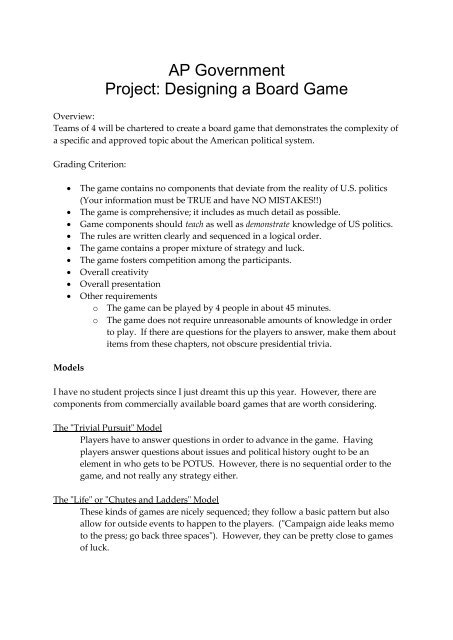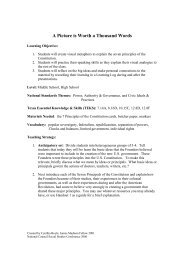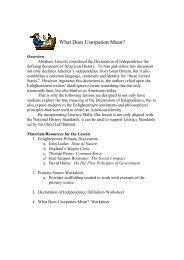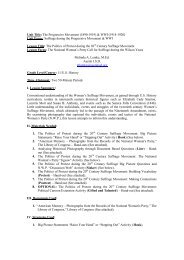AP Government Project: Designing a Board Game
AP Government Project: Designing a Board Game
AP Government Project: Designing a Board Game
You also want an ePaper? Increase the reach of your titles
YUMPU automatically turns print PDFs into web optimized ePapers that Google loves.
<strong>AP</strong> <strong>Government</strong><br />
<strong>Project</strong>: <strong>Designing</strong> a <strong>Board</strong> <strong>Game</strong><br />
Overview:<br />
Teams of 4 will be chartered to create a board game that demonstrates the complexity of<br />
a specific and approved topic about the American political system.<br />
Grading Criterion:<br />
� The game contains no components that deviate from the reality of U.S. politics<br />
(Your information must be TRUE and have NO MISTAKES!!)<br />
� The game is comprehensive; it includes as much detail as possible.<br />
� <strong>Game</strong> components should teach as well as demonstrate knowledge of US politics.<br />
� The rules are written clearly and sequenced in a logical order.<br />
� The game contains a proper mixture of strategy and luck.<br />
� The game fosters competition among the participants.<br />
� Overall creativity<br />
� Overall presentation<br />
� Other requirements<br />
o The game can be played by 4 people in about 45 minutes.<br />
o The game does not require unreasonable amounts of knowledge in order<br />
to play. If there are questions for the players to answer, make them about<br />
items from these chapters, not obscure presidential trivia.<br />
Models<br />
I have no student projects since I just dreamt this up this year. However, there are<br />
components from commercially available board games that are worth considering.<br />
The "Trivial Pursuit" Model<br />
Players have to answer questions in order to advance in the game. Having<br />
players answer questions about issues and political history ought to be an<br />
element in who gets to be POTUS. However, there is no sequential order to the<br />
game, and not really any strategy either.<br />
The "Life" or "Chutes and Ladders" Model<br />
These kinds of games are nicely sequenced; they follow a basic pattern but also<br />
allow for outside events to happen to the players. ("Campaign aide leaks memo<br />
to the press; go back three spaces"). However, they can be pretty close to games<br />
of luck.
The "Monopoly" Model<br />
The strategy involved is a nice plus, but be wary of open-ended games; they take<br />
too long to play. The money supply aspect to the game is appropriate vis a vis<br />
elections, but also one that complicates your game considerably, and remember,<br />
the "winner" is not necessarily the candidate with the most money. The Chance<br />
and Community Chest Card concept could be modified to include outside events<br />
as well as demonstrate your knowledge of the concepts. ("Fundraiser a stunner!<br />
Collect $500" or "Opponent makes a gaffe in the debate, advance 3 spaces")<br />
The Chess Model<br />
DO NOT TRY TO DESIGN A PURE STRATEGY GAME.<br />
You might as well go study <strong>Government</strong> in college and then sign up to work for<br />
a real US political campaign in 2004 and make it a career. When you have<br />
figured out how to capture all the strategy involved in politics into a board game,<br />
please let me as well as the American people know about it.<br />
Other considerations and questions<br />
� <strong>Designing</strong> a game where the players compete directly against one another is<br />
inherently more complex than designing one where the players compete with the<br />
game. While I reward risk-taking, be careful about trying to make up the perfect<br />
game and ending up with a confusing mess.<br />
� Be sure that there are no "dead ends" in the game.<br />
� How will you determine the winner? Is it the last person in the game? If so, how<br />
will others be eliminated? Is it the first one to the finish line? If so, how is<br />
advancement obtained?<br />
� What materials do you need? (Dice? Tokens? Cardstock? I am providing the<br />
boards and nothing more)<br />
� How are you going to divide up the work among team members? I suggest that<br />
you schedule a meeting somewhat before the due date so that you can finish the<br />
design, building, and testing of the game.<br />
We will evaluate your games by playing them in class and grading them according to a<br />
rubric based on the criteria above. Plan accordingly. This project should be fun, but it<br />
is NOT easy!!
<strong>AP</strong> <strong>Government</strong><br />
Team being Evaluated:________________________<br />
<strong>Board</strong> <strong>Game</strong> <strong>Project</strong> Rubric Evaluators:_________________________________<br />
You must fill out one of these for your own team prior to Thursday’s class. You will also fill out<br />
one of these for the game that you play. Grade inflation makes you look silly.<br />
Criterion: The rules are written clearly and sequenced in a logical order.<br />
1 2 3 4 5<br />
Missing Weak Pretty Good Strong Amazing<br />
Met expectations Very thorough<br />
Comments:<br />
Teachers<br />
Rating<br />
Criterion: The game’s essential design incorporates key features of the U.S. political<br />
topic/subject.<br />
Teachers<br />
Rating<br />
1 2 3 4 5<br />
Missing Weak Pretty Good Strong Amazing<br />
Met expectations Very thorough<br />
Comments:<br />
Criterion: The game details demonstrate knowledge of the U.S. political topic/subject.<br />
Teachers<br />
Rating<br />
1 2 3 4 5<br />
Missing Weak Pretty Good Strong Amazing<br />
Met expectations Very thorough<br />
Comments:<br />
Criterion: The game TEACHES players about the U.S. political topic/subject you have<br />
chosen as they play.<br />
Teachers<br />
Rating<br />
1 2 3 4 5<br />
Missing Weak Pretty Good Strong Amazing<br />
Met expectations Very thorough<br />
Comments:
Criterion: The game combines features of other games, includes some strategy or<br />
knowledge in addition to luck, and it fosters competition among the<br />
participants.<br />
Teachers<br />
Rating<br />
1 2 3 4 5<br />
Missing Weak Pretty Good Strong Amazing<br />
Met expectations Very thorough<br />
Comments:<br />
Criterion: The game is comprehensive: it includes components and topics from<br />
throughout the subject you have chosen.<br />
Teachers<br />
Rating<br />
1 2 3 4 5<br />
Missing Weak Pretty Good Strong Amazing<br />
Met expectations Very thorough<br />
Comments:<br />
Criterion: Presentation and craftsmanship are neat and professional.<br />
1 2 3 4 5<br />
Sloppy Sketchy Pretty Good Strong Amazing<br />
Met expectations Very thorough<br />
Comments:<br />
Criterion: Overall creativity.<br />
1 2 3 4 5<br />
Missing Standard Pretty Good Strong Amazing<br />
Met expectations Very thorough<br />
Comments:<br />
Teachers<br />
Rating<br />
Teachers<br />
Rating<br />
Criterion: The reflective narrative properly explains the game design considerations.<br />
Teachers<br />
Rating<br />
1 2 3 4 5<br />
Missing Weak Pretty Good Strong Amazing<br />
Met expectations Very thorough<br />
Comments:
Final Rating & Rationale<br />
Comments:<br />
1 2 3 4 5<br />
Missing Weak Pretty Good Strong Amazing<br />
Met expectations Very thorough<br />
Teachers<br />
Rating







